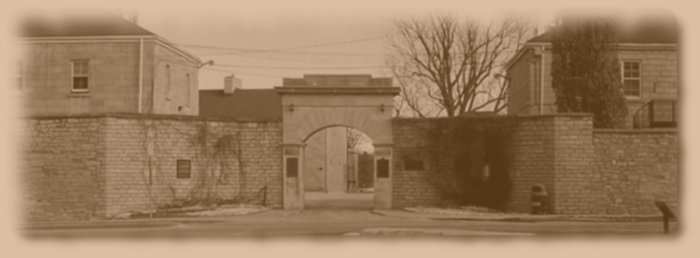Topic: Military Theory
 The front gates of Fort Frontenac, Kingston, Ontario,
The front gates of Fort Frontenac, Kingston, Ontario,
home of the Canadian Army Command and Staff College.
Responsibilities of the Staff (1899)
From the Lecture on "The Evolution of the Canadian Army" by Capt. C.F. Winter, the G.G. Foot Guards; The Officers' Association of the Militia of Canada; Transactions of the Semi-Annual Meeting 1899
In peace time the General Staff work out all details belonging to mobilization, marching, stationing, manoeuvres, and all military matters connected with railways and telegraphs. They should study all possible theatres of war — the preparation of maps, and the elaboration of plans, &c., for possible movements based upon a careful study of past experiences in similar emergencies also the instruction of younger officers in Staff duties.
In war time their duties become of greater importance. They are thus laid down by General von Schellendorf:—
1. Working out ail arrangements for the quartering, security, marching and fighting of troops, according to the varying conditions of the military situation.
2. Communicating the necessary orders, either verbally or in writing, at the right time and in sufficient detail.
3. Obtaining, collecting and working out in order all materials which concern the natural and the military features of the theatre of war and the procuring of maps.
4. Collecting and estimating the value of information received concerning the enemy's forces and reporting on the same to the higher military authorities.
5. Keeping up the fighting condition of the troops and being constantly informed of their condition in every respect.
6. Charge of day books publishing reports of engagements and the collection of important materials to afterwards form a history of the war.
7. Special duties, viz: — reconnaissances.
Now you may have possibly gathered from all this that this General Staff becomes a lot of "knows-alls" with perhaps "swelled heads," and form a sort of Corps of Officers of somewhat different make-up to the other officers of in the National Force, but this is quite an error — in all the larger European Armies experience has taught that officers selected and trained in the duties of the General Staff are kept at their best by frequent returns to regimental duty and periods of training with the different arms. There is no desire to place themselves on a superior plane to their regimental comrades, but rather to ensure throughout the whole army of the country that systematical co-operation which alone can give success to any military effort. It is to this end that the initial training of a party of our Officers is now proceeding under Col. Kitson at the Royal Military College, Kingston.

